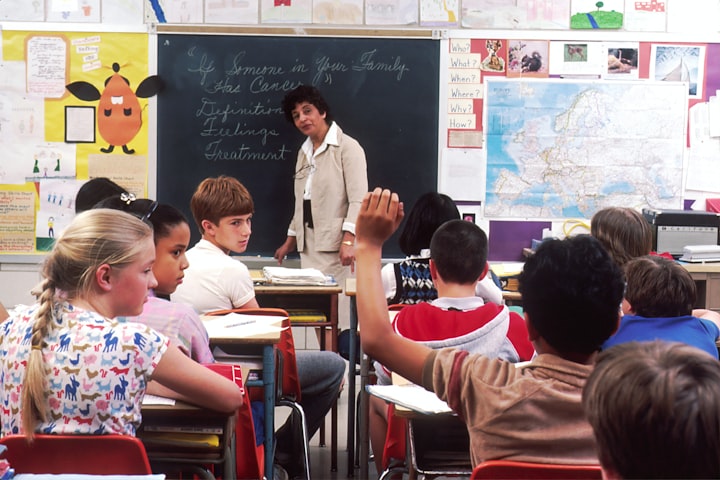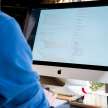
01 The bully doesn't need talent, he needs method
My cousin did not perform well in the college entrance examination this year and failed to get into the college of her choice.
She also told us that two of the bully students in her class had easily gotten into Tsinghua, where they scored perfect marks in mathematics and physics.
Once the comparison was made, my cousin became more and more inferior and always felt that her brain was not enough and that she was not study material.
When I heard my cousin's lament, I could only silently hug her and not say anything.
Because I have also experienced this kind of confusion and self-denial.
From primary schools and junior high school to high school and university, there was never a shortage of academic figures around me.
I also wondered why other students became school bully but not me.
Why are the academics so good at studying? They get full marks in exams easily, and go to Tsinghua University and Peking University casually.
Is it because they are gifted, or because they hang their heads from the beam and study hard all night?
One day, I found the answer in a book called "The Way to Learn: Life Advice from a Nobel Laureate".
Learning well does not depend on talent, but on the right approach.
A scientific approach to learning is what makes learning easy and effective, and allows us to grasp the essential laws and understand the core principles behind complex phenomena more quickly.
The book meticulously examines our misconceptions about learning and introduces the 7 key energy-saving aspects of scientific research that can comprehensively help lifelong learners to improve their inner learning and thinking power.
It is worth a study.
02 Recognising the original purpose of learning
When it comes to learning, many people think that learning is about receiving knowledge, digesting it and remembering it.
The Spanish contact pathologist, histologist and neurologist Santiago Ramón. Ramón. The Spanish contact pathologist, histologist and neurologist Santiago Ramon Cajal, was the winner of the 1906 Nobel Prize in Biology or Medicine.
He summed up his scientific career by concluding that learning is not about copying the knowledge of previous generations and blindly worshipping authority, but about boldly doubting and overturning the views of those who have gone before us.
Without doubt and overthrow, there can be no new progress or development.
This is the original purpose of learning.
In real life, many people lose sight of this.
We become certain that what we know in textbooks is correct and that we have all the important issues in each subject area figured out.
So we don't need to continue to think, we don't need to critique existing scientific results, we just copy and save.
But those scientists who can really learn never think that way.
Chen Jingrun challenged the "tower problem" in Hua Luogeng's "Theory of Permutations" and suggested specific improvements that contributed to the development of mathematics.
Galileo dared to question Aristotle's theory that "the speed of an object falling is proportional to its weight, and the heavier the object, the faster it falls", which had been held true for 1700 years, and carried out experiments on the Leaning Tower of Pisa.
It is thanks to the bravery and boldness of these men that our science has reached the heights it has today.
In the first chapter of his book, Cahal encourages all learners not to be overly convinced by authority.
Authority is not always right, and it is the purpose of our learning to remove the aura of cultism, to take facts seriously, to be bold in our assumptions and reflections, and to dare to criticise.
03 Two Spiritual Qualities Indispensable for Developing Learning Abilities
Since the purpose of learning is to continually make breakthroughs and improve on existing perceptions, what are the elements needed to develop the ability to learn?
Cahal offers a number of suggestions, of which I find the following two very practical.
One is independent judgement and the other is sustained concentration.
By independent judgement, I mean maintaining one's own viewpoint and making one's own judgement without being influenced by others.
In the age of the information explosion, with all kinds of values running rampant, we need to have the most basic judgement and not lose our way in the mass of information fragments.
For example, reading a book, no matter how well written its author is, there is a limit to the amount of essence we can draw from it, because the author's perception of the book is also limited.
We have to read it again and again until we can't gain new knowledge and perspectives, and that's when you form your own judgement and understanding.
This is the key to developing the ability to learn and think.
When you see news breaking out on the internet, don't be led away from your own thinking by the one-sided voices of netizens.
Maintain your independent judgement so that you can "let the bullets fly a little longer" and get closer to the truth.
Without independent thinking, it is difficult to learn effectively when we are always in agreement with others.
It's the same as "following someone else's example". If we just copy what someone else is wearing, what they are doing or what they are looking like, we are bound to make a fool of ourselves.
It is the same with learning.
We can refer to the methods and conclusions of others, but we should not copy them.
We must add our own reflections and judgements, choosing what is right and useful and rejecting what is wrong and not suitable for us.
This is the basis for effective learning.
In addition to independent thinking, we also need to develop our concentration.
Concentration is the ability to focus on one thing at the moment.
Anyone who has children at home will have experienced the scenario of a child grinding away at their study work.
It may seem like the child is sitting there and not being naughty, but the child is picking his or her fingers, playing with origami, drifting off, dozing off, and not concentrating on their studies at all.
If this is the case, then you let your child sit in the room all day and he will not finish a paper.
Without concentration, even if he finishes his homework, it will be scribbled and full of mistakes, and he will not learn anything at all.
The same is true for adults.
When we want to learn something, we are interrupted by WeChat, Jitterbug, Weibo, all kinds of beeps, and our attention wanders off, glancing at our phones for a while, processing a few messages later.
Only when you put your phone down do you realise that most of the day has passed and you have only read a few words of what you want to study.
Without sustained focus, it is difficult for us to learn and learn solidly, and learning becomes superficial or superficial.
04 The age of lifelong learning is here and everyone needs to keep learning
Whether you are a teenager or an adult, we all have to continue learning and growing throughout our lives.
In the process, we go off on tangents, we get overwhelmed, we don't know what to do.
Cahal, himself a leading authority on neurology and a university teacher, has combined his research experience with his teaching experience to write this book, Ways of Learning.
He lists many of the misconceptions we have about learning, and then points out the methods and operational skills we need to master, including how to do research and how to write papers.
This book is a must-read for many international university students and young scholars, and likewise for everyone who wants to improve themselves and stay productive in their studies.
There is an old Chinese saying that if you want to be good at what you do, you must first be good at what you do.
If you want to make a difference in any field and achieve success, constantly learning new knowledge and new skills is an essential path.
A learning method is a tool for learning.
Today is a fast-paced era where time has been severely fragmented. There are many difficulties and temptations to overcome if we want to learn, and if we don't learn in the right way, we are wasting time and precious energy.
Cahal says it very well in The Way to Learn: "All great achievements are the result of patience and persistence, coupled with a sustained focus on a problem for months or even years."
If you want to realise your dreams, if you want to change your destiny and reach higher peaks through learning, then master the ways of learning and start studying!






Comments
There are no comments for this story
Be the first to respond and start the conversation.